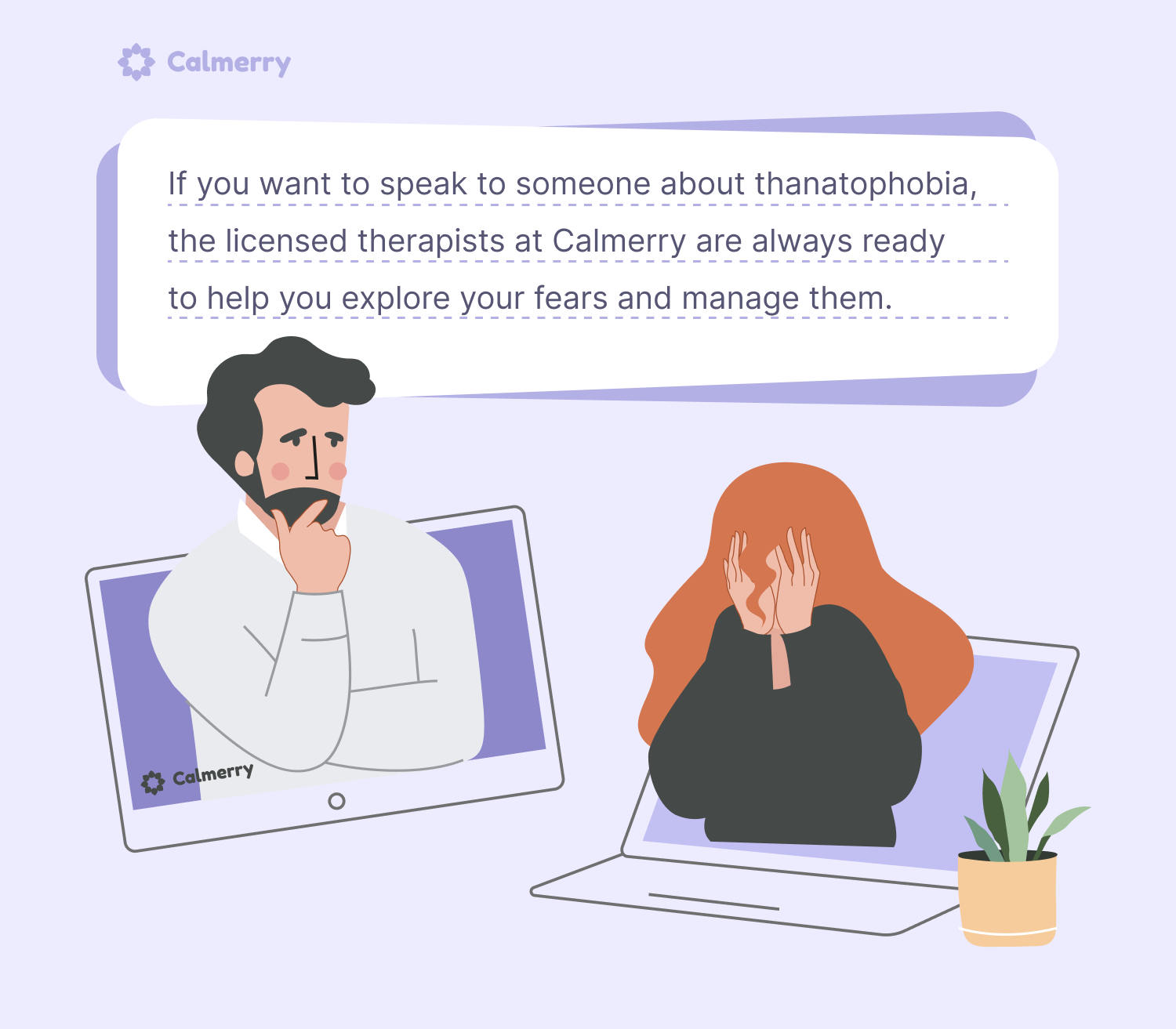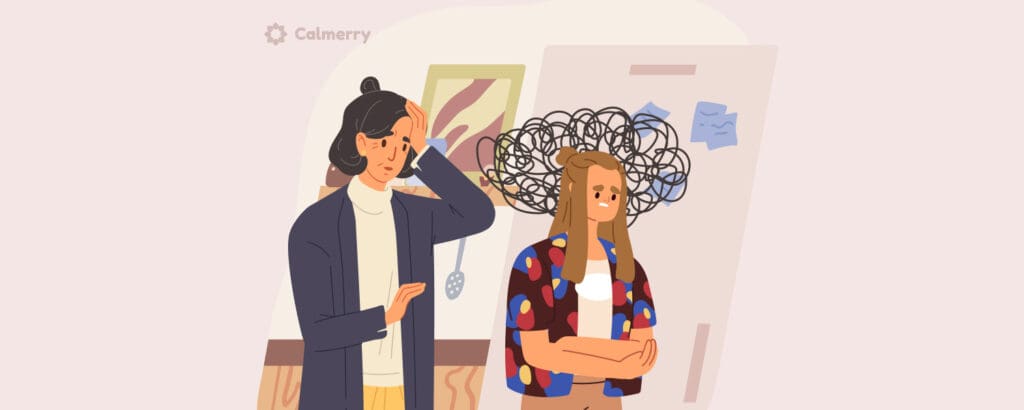What Is Death Anxiety (Thanatophobia or Fear of Death): Symptoms & Ways To Overcome It

In this article
Despite the inevitability of death or the death of loved ones, it’s something that many of us choose not to think about too often.
This is perfectly normal, as, after all, the thought of the death of a loved one or leaving them behind is not exactly uplifting. And it’s entirely reasonable to feel concerned about what happens after you are gone.
However, some people go to excessive lengths to avoid thinking or talking about death altogether. Because if they do, it brings about intense feelings of apprehension, panic, and dread.
We’re talking about those who have a type of fear known as death anxiety, also referred to as thanatophobia. Death anxiety is a constant fear of mortality or dying that’s so severe that it interferes with daily activities.
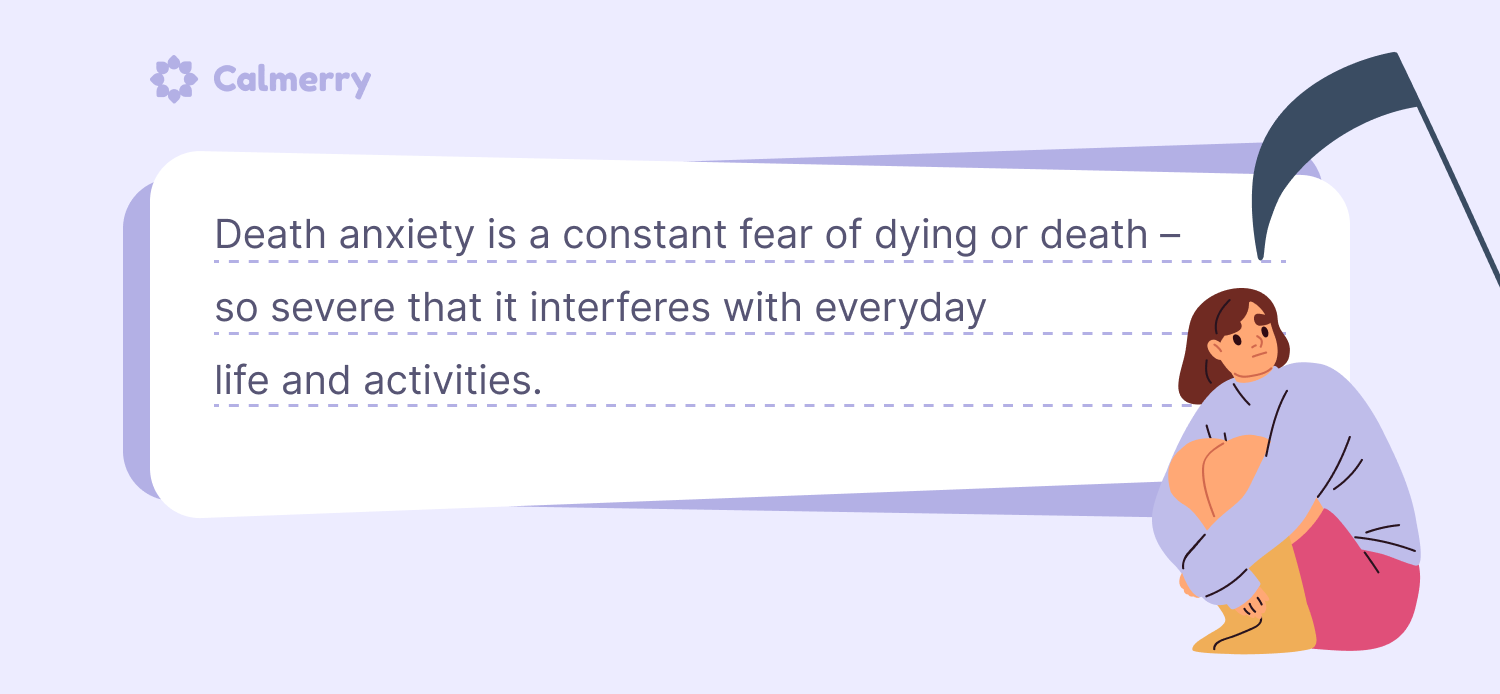
Fortunately, with the right help, there are ways to overcome thanatophobia, which we will cover in this blog. We’ll also look at the symptoms, causes, risk factors, and best self-care tips so you’ll have everything you need to know about this mental health issue.
What is death anxiety, actually?
Thanatophobia is an intense fear of death, worry about death or the dying process. While thanatophobia is different from necrophobia (fear of dead bodies), clinicians typically classify it as a specific phobia, which is a type of anxiety disorder. Death anxiety also plays a significant role in psychopathology of various mental health conditions. Death anxiety is also associated with increased psychological distress and can manifest differently across cultures and belief systems.
While it’s normal to have some fears about death or the process itself, these concerns don’t affect most people’s daily lives. Whereas for those with thanatophobia, their extreme fear of death can be so intense that it causes various distressing symptoms and interferes with everyday activities.
So, how can we tell what is thanatophobia and what isn’t? Generally, someone’s fear of death would be considered a specific phobia if:
- It persists for longer than six months
- It affects their daily life
- A person experiences intense distress whenever they think about death
- They avoid situations that remind them of death or dying
What does Thanatophobia feel like?
The symptoms of death anxiety can vary from person to person, and they may only present themselves when you have thoughts of death or are confronted by death or the process of dying.
That’s why people with thanatophobia often avoid situations where they have to think about mortality as a way of coping with and preventing symptoms. However, avoidance can reinforce the fear and worsen symptoms over time.
Here are some of the most common symptoms that people with thanatophobia experience:
- Anxiety, fear and dread of death
- Panic attacks, dizziness, shortness of breath, sweating, and heart palpitations
- Stomach ache or nausea when thinking about mortality
- Regularly worrying (catastrophic thinking)
- Avoiding triggers and withdrawing socially
When a person’s thanatophobia is linked to another mental health disorder, they may also experience additional symptoms related to that condition.
What causes death anxiety?
As with other specific phobias, there isn’t a single exact cause of thanatophobia. Therefore, it’s not usually clear why it starts. When reviewing the status of research on this topic, several factors have been identified.
Social influences
Thanatophobia may be a learned response that a person developed in childhood from a sibling or parent. Cultural attitudes and death attitudes may also influence how people perceive and react to the idea of death.
Life experiences
Past incidents or trauma related to the loss of a loved one may develop death anxiety. Experiences at the end of life of someone close can shape unrealistic beliefs about death and create apprehension.
Mental health conditions
Thanatophobia may develop alongside or as part of other mental health conditions like illness anxiety disorder or generalized anxiety disorder. People with obsessive-compulsive disorder (OCD) may develop obsessive thoughts about harm or death.
Is death anxiety connected to other phobias?
Fear of death or dying may be associated with a range of mental health conditions. Therefore, it’s believed that thanatophobia is often linked to or can emerge alongside the following disorders:
- Specific phobia – For example, you fear an object or situation like flying and worry you’ll die in a plane accident.
- Panic disorder – For example, having a panic attack and worrying that you’re dying from a heart attack.
- Post-traumatic stress disorder (PTSD) – For example, having vivid flashbacks of a traumatic, life-threatening event happening again.
- Obsessive-compulsive disorder (OCD) – For example, repeatedly checking you’ve turned appliances off out of fear of accidentally causing a fire and harming yourself or others.
- Illness anxiety disorder (Hypochondriasis) – For example, regularly worrying you have a life-threatening illness.
- Separation anxiety disorder – For example, a child may fear being permanently separated due to their parents dying.
- Somatic symptom disorder – For example, fearing that your symptoms are life-threatening despite the medical evaluation saying otherwise.
- Generalized anxiety disorder – For example, having persistent and excessive worry about mortality among other concerns.
- Social anxiety – For example, fearing judgment from others about your fears.
- Depressive disorders – For example, having existential depression and fearing that your life was meaningless.
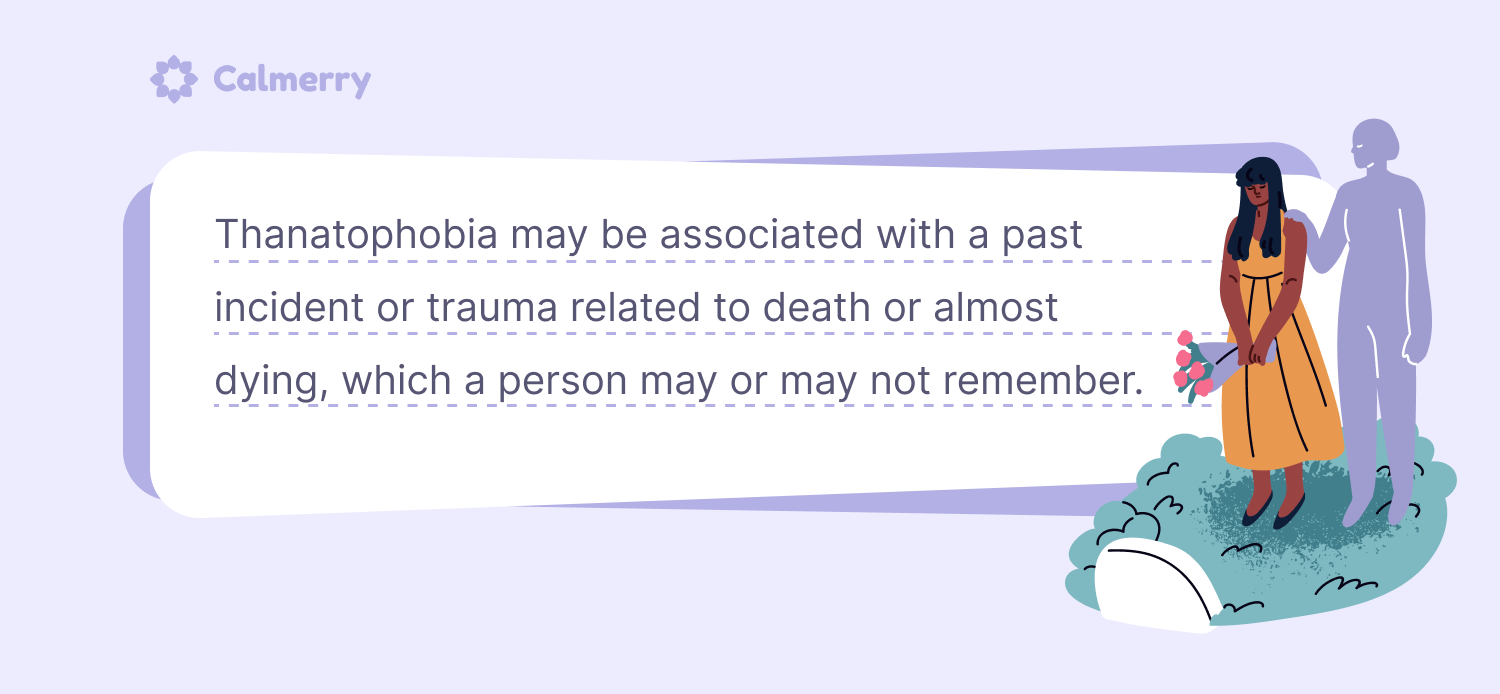
Why do some people experience death anxiety more than others?
It’s thought that the following risk factors can make some people more likely to develop thanatophobia:
- Age: Thanatophobia is most common among people in their 20s and becomes less common with age. Young people tend to fear mortality itself, whereas older adults tend to fear the dying process.
- Sex: Younger men and women experience thanatophobia equally, but women in their 50s are more likely to have it than men of the same age.
- Heath problems: Patients with advanced cancer or other severe illnesses may experience thanatophobia.
- Attitude: A study suggests that people with greater humility are less likely to develop thanatophobia because they have lower level of self-focus and are more willing to accept their circumstances.
Acceptance of death: Those who have come to terms with the fact that death is inevitable may experience less distress than death than others. Personal attitudes: Individual beliefs and perspectives about mortality may influence how much unease one experiences.
Is there a connection between death anxiety and panic attacks?
It’s not uncommon for people with thanatophobia and other phobias to suffer from panic attacks. While they are not life-threatening, they can cause intense feelings of panic, be distressing, and happen very suddenly.
While it may be difficult to prevent them from happening altogether in the short term, there are some things you can do to help you cope and gain some control.
Here are some tips on what you should do during a thanatophobia-induced panic attack:
- Recognize that you’re having a panic attack
- Remind yourself that you’re safe and that it’s not life-threatening
- Remind yourself that these feelings are temporary and will pass
- Stay where you are and ride it out, if possible
- Breathe deeply and slowly
- Focus on an object or relaxing image
- Engage all your senses
The relationship between thanatophobia and panic disorder is significant, as many people experience symptoms of both conditions simultaneously. Fear of death affects your thought patterns which may may trigger panic attacks, while having panic attacks may intensify one’s anxiety and fear of mortality.
When to seek help
It’s normal to have some concerns about your health as you age or to worry about dying occasionally.
However, if you regularly experience extreme anxiety around death, it may be time to seek professional help. This includes if your fears affect your daily life, if you avoid triggering situations, or if you’re using drugs or alcohol to cope.
You can seek help by talking to your doctor about what you’re experiencing or booking a session with a mental health professional.
Diagnosis and death anxiety test
As thanatophobia, or death anxiety, is not a clinically recognized condition, your doctor or therapist will As thanatophobia is not a clinically recognized condition, your doctor or therapist will likely classify it as a specific phobia. However, they will note that fear of mortality or dying is the root of your distress.
Your doctor or therapist will carry out a psychological evaluation to help them make an accurate diagnosis, which can involve questions about the following:
- What your symptoms are, and how long you’ve had them
- How severe and restricting your symptoms are
- Events in your personal and family history related to death and dying
- What triggers your fears
- Your thoughts and emotions
- Your lifestyle, diet, health status, and sleeping patterns
The doctor will try to determine how intense your fear is in relation to your circumstances. They will also assess whether your thanatophobia is linked to any other underlying mental health conditions like social anxiety or illness anxiety disorder.
You can take this clinically-validated death anxiety test. This test can help identify levels of anxiety related to the particular fear of dying. Just by asking yourself these questions, you can gain much insight into your emotional state.
Please note: online screening tools are not diagnostic instruments. Consider sharing your results with a doctor or a licensed therapist who can give you a full assessment.
Treatment of death anxiety
A few treatment options are available for specific phobias like thanatophobia, such as psychotherapy, exposure therapy, and relaxation techniques. Based on your diagnosis and symptoms of death anxiety, your doctor or therapist will advise which treatment or combination of treatments is most suitable for you.
If there is another underlying mental health condition linked to your thanatophobia, then they may recommend other appropriate treatments for that.
Talking therapy
Talking therapies like psychotherapy or psychoanalytic therapy are often used to treat phobias. They involve sharing your experiences and talking through your fears with a licensed therapist.Your therapist will help you understand the cause of your concerns and develop effective coping strategies.
Cognitive behavioral therapy (CBT)
CBT involves identifying unhelpful behavioral and thinking patterns that may be contributing to your thanatophobia and then finding practical ways to change them to help you overcome your fears.
Through CBT, you can develop coping strategies that allow you to cope with your distress and stay calm when thinking about mortality. CBT usually requires several individual sessions with a professional, which are carried out over a period of weeks or months – in-person or online.
Exposure therapy
Exposure therapy involves exposing a person to situations or thoughts that trigger their thanatophobia. The goal is to desensitize them gradually by allowing them to face their fears in a safe environment.
Each exposure reduces their fear response, helping them overcome unhealthy coping methods like avoidance and eventually feel unafraid when talking or thinking about death or the dying process.
Relaxation techniques
Your therapist may recommend relaxation techniques like breathing exercises, meditation, mindfulness, and guided imagery to help you relieve distress when it arises.
Medication
Sometimes, a doctor might prescribe medication for specific phobias to help relieve the symptoms, especially if your fear is linked to another underlying mental health disorder.
However, for thanatophobia alone, medication is not usually an effective long-term solution. Instead, they may prescribe it short-term to help you confront your fears as you go through talking therapy. Treatment may vary depending on individual circumstances.
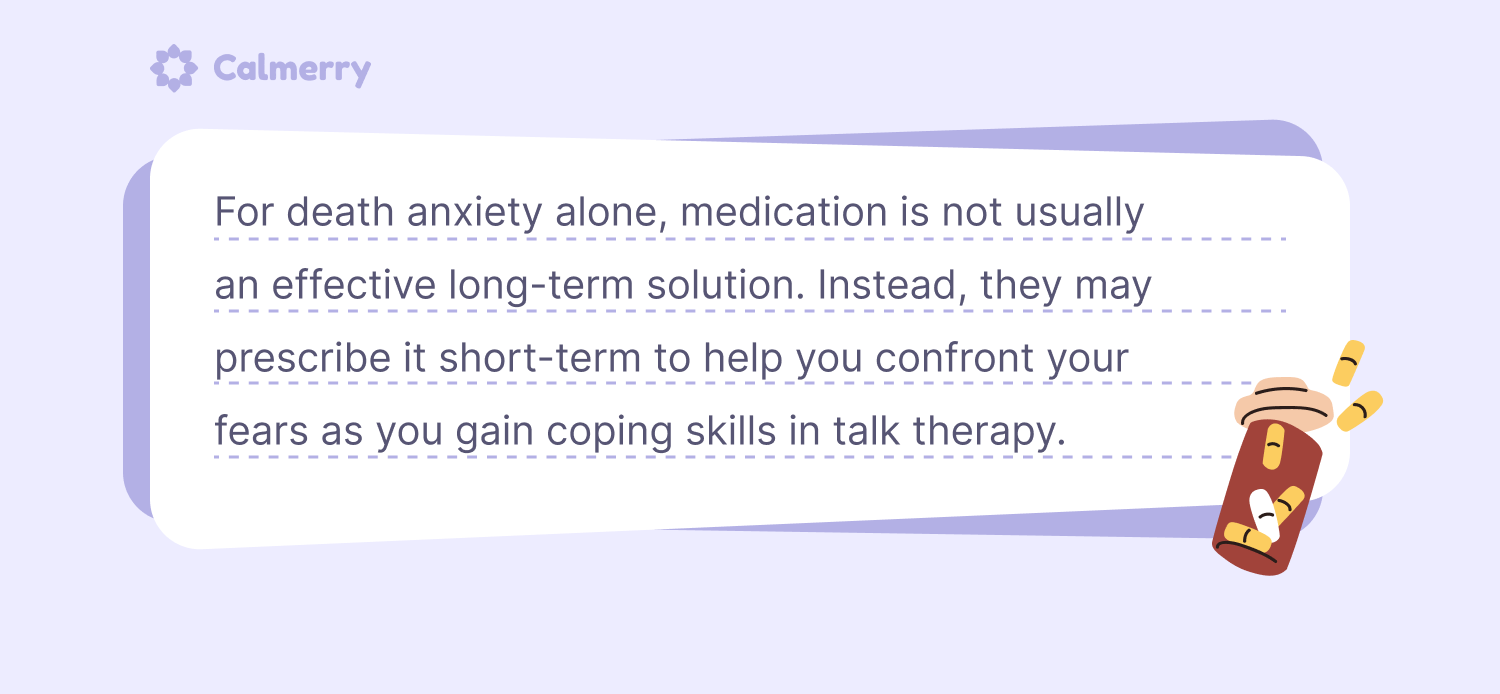
8 Self-care tips for thanatophobia
Below are some ideas you can try to cope with and address your feelings about mortality. You might find some of these helpful, while others may not work for you.
Nonetheless, remember that these self-care tips are not designed to replace professional help and treatments.
1. Talk to someone
Speaking to someone you trust and sharing your personal experiences with thanatophobia can help you feel more in control.
Knowing that someone cares and is supportive can also help you feel not ashamed and more willing to face your fear.
2. Stick to your treatment plan
You shouldn’t expect thanatophobia to go away on its own. The surest way to overcome it is to seek professional help.
Once you seek help, it’s essential to stick to your treatment plan and attend therapy sessions.
3. Join a support group
By joining an in-person or online support group, you can share your experiences with other people facing similar challenges. Knowing that you’re not suffering alone can be comforting, and others may be able to help you by sharing coping methods that work for them.
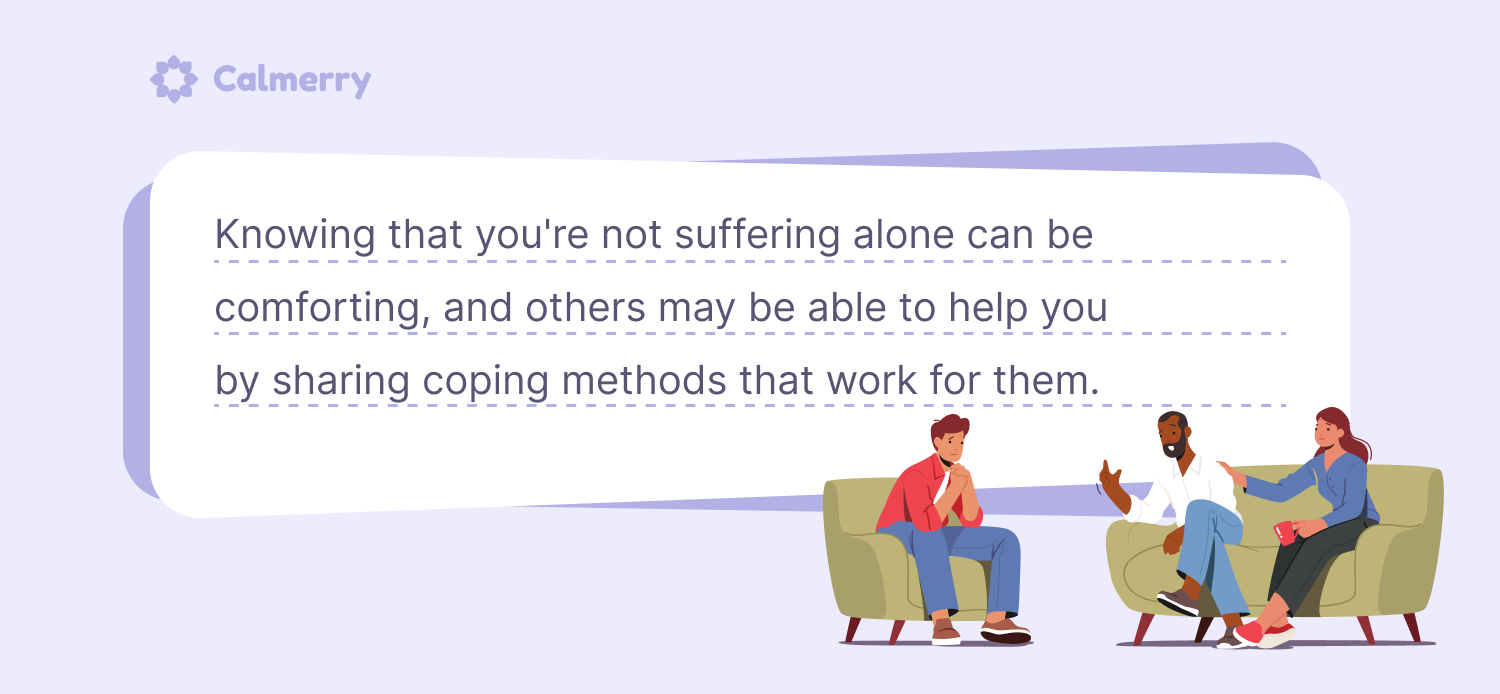
4. Write down your thoughts
Write down a list of all your mortality-related fears to identify what you are afraid of and what triggers you. This can be an excellent first step if you’re finding it hard to talk about phobia with others, and it’s something you could take with you to a therapy session.
5. Avoid unhelpful coping strategies
When distressing thoughts arise, you may be tempted to seek immediate relief through unhealthy coping methods like alcohol or drugs. However, these methods can leave you feeling worse off and increase general anxiety in the long run.
6. Meditation
Research suggests that meditation and mindfulness exercises can reduce stress and apprehension. It’s also a good way to relax and calm the mind when you experience panic.
7. Look after your health
Getting enough sleep, regular exercise, and a balanced diet are a few ways you can stay healthy, reduce stress, ease worry, and feel better. Reducing caffeine consumption can also help with nervousness.
8. Educate yourself
Engaging in psychoeducation and reading self-help books like “The Anxiety and Phobia Workbook” written by experts in CBT could offer practical tips on overcoming or dealing with your phobia.
Summing all up
Most of us are afraid of death to some degree, as it involves so many unknowns. But death anxiety is more than that. It’s a fear of death that has developed into a distressing phobia that affects daily life.
Fortunately, it is possible to manage and treat it, especially with the help of a caring professional.
If you’d like to speak to someone about thanatophobia, the licensed therapists at Calmerry are always ready to help you understand your fears and manage them. They can offer expert, impartial guidance and evidence-based treatment to help you overcome your phobia.
FAQ
What is thanatophobia?
Thanatophobia is an intense fear of death or the dying process that causes significant distress and interferes with daily functioning. It’s classified as a specific phobia and is different from necrophobia (fear of corpses).
Is death anxiety a normal feeling?
Yes, some level of concern about mortality is normal. Death is inevitable, and it’s natural to worry occasionally. However, when worry becomes excessive and impacts your quality of life, it may have developed into thanatophobia.
What are the main causes of death anxiety?
Thanatophobia may develop due to various factors including social influences, life experiences such as the loss of a loved one, and underlying mental health conditions. Some people are more likely to develop this fear due to genetic predispositions or personality traits.
How do I know if I have death anxiety?
Signs of thanatophobia include persistent and intense fear when thinking about mortality, physical symptoms like panic attacks when confronted with death-related topics, and avoidance of situations that remind you of death. If these symptoms persist for over six months and interfere with daily life, you may have thanatophobia.
Can death anxiety lead to other mental health issues?
Yes, thanatophobia may contribute to or exacerbate other mental health conditions such as panic disorder, generalized anxiety disorder, and depression. The relationship between death anxiety and various mental health issues is complex and often bidirectional.
How do different religions and philosophies view death anxiety?
Different religions and philosophical traditions offer various perspectives on mortality. Many provide frameworks for understanding and accepting the inevitability of death, which can help reduce thanatophobia. Religious beliefs often include concepts of an afterlife, which may provide comfort to those with fears.
What are some effective ways to cope with death anxiety?
Ways to overcome thanatophobia include seeking professional help, practicing mindfulness and relaxation techniques, educating yourself about mortality, joining support groups, maintaining physical health, and developing a philosophical or spiritual understanding of death.
Can therapy help with overcoming death anxiety?
Yes, psychotherapy, particularly cognitive behavioral therapy (CBT) and exposure therapy, can be highly effective in treating thanatophobia. These therapeutic approaches help individuals understand and change unhelpful thought patterns and gradually face their fears in a controlled, supportive environment.
At what age is death anxiety most common?
Thanatophobia among young adults in their 20s is most common, though it can affect people of all ages. Younger people often fear mortality itself, while older adults tend to fear the dying process more. Women in their 50s are more likely to experience this fear than men of the same age.
Are there medications that can help with death anxiety?
While there are no medications specifically for thanatophobia, doctors may prescribe anti-anxiety medications or antidepressants to help manage symptoms, especially if your condition is accompanied by other mental health conditions like panic disorder or generalized anxiety disorder. Medication is typically used as a short-term solution alongside therapy.
online therapy
live video session

